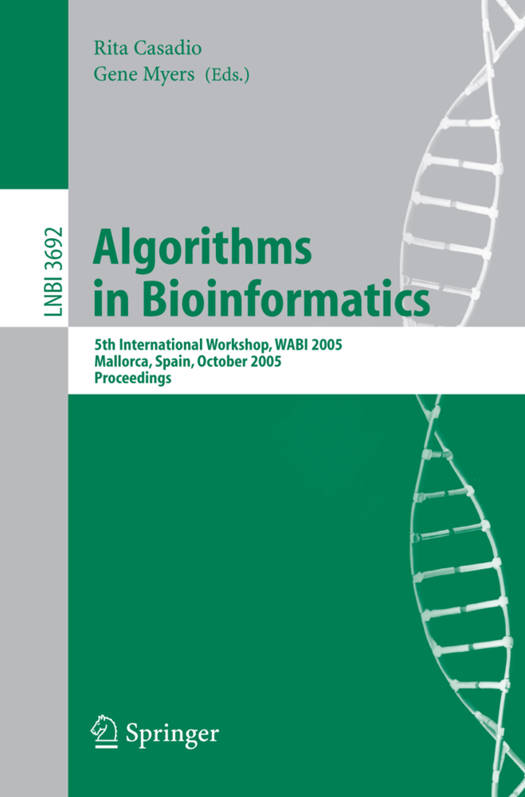
Bedankt voor het vertrouwen het afgelopen jaar! Om jou te bedanken bieden we GRATIS verzending (in België) aan op alles gedurende de hele maand januari.
- Afhalen na 1 uur in een winkel met voorraad
- In januari gratis thuislevering in België
- Ruim aanbod met 7 miljoen producten
Bedankt voor het vertrouwen het afgelopen jaar! Om jou te bedanken bieden we GRATIS verzending (in België) aan op alles gedurende de hele maand januari.
- Afhalen na 1 uur in een winkel met voorraad
- In januari gratis thuislevering in België
- Ruim aanbod met 7 miljoen producten
Zoeken
Algorithms in Bioinformatics
5th International Workshop, Wabi 2005, Mallorca, Spain, October 3-6, 2005, Proceedings
€ 167,95
+ 335 punten
Omschrijving
We are pleased to present the proceedings of the 5th Workshop on Algorithms in Bioinformatics (WABI 2005) which took place in Mallorca, Spain, October 3-6, 2005. The WABI 2005 workshop was part of the ?ve ALGO 2005 conf- ence meetings, which, in addition to WABI, included ESA, WAOA, IWPEC, and ATMOS. WABI 2005 was sponsored by EATCS (the European Assoc- tion for Theoretical Computer Science), the ISCB (the International Society for Computational Biology), the Universitat Polit` ecnica de Catalunya, the U- versitat de les Illes Balears, and the Ministerio de Educaci´ on y Ciencia. See http: //www.lsi.upc.edu/~wabi05/ for more details. The Workshop on Algorithms in Bioinformatics highlights research work speci?cally developed to address algorithmic problems in biosequence analysis. Theemphasisisthereforeonstatisticalandprobabilisticalgorithmsthataddress important problems in the ?eld of molecular and structural biology. At present, given the enormous scienti?c and technical e?orts in functional and structural genomics, the relevance of the problem is therefore constrained by the need for sound, e?cient and specialized algorithms, capable of achieving solutions that can be tested by the biological community. Indeed the ultimate goal is to - plement algorithms capable of extracting real features from real biological data sets. Therefore the workshop aims to present recent research results, including signi?cant work in progress, and to identify and explore directions of future research.
Specificaties
Betrokkenen
- Uitgeverij:
Inhoud
- Aantal bladzijden:
- 436
- Taal:
- Engels
- Reeks:
- Reeksnummer:
- nr. 3692
Eigenschappen
- Productcode (EAN):
- 9783540290087
- Verschijningsdatum:
- 27/09/2005
- Uitvoering:
- Paperback
- Formaat:
- Trade paperback (VS)
- Afmetingen:
- 156 mm x 234 mm
- Gewicht:
- 621 g

Alleen bij Standaard Boekhandel
+ 335 punten op je klantenkaart van Standaard Boekhandel
Beoordelingen
We publiceren alleen reviews die voldoen aan de voorwaarden voor reviews. Bekijk onze voorwaarden voor reviews.








